“For whenever you want to feel like Professor Snape at Hogwarts.”
Recently I was fortunate enough to get a second part-time job as a games master at Pips, a board game cafe in Calgary. After working there a few weeks, I am thoroughly enjoying this job, being able to recommend, teach, and even play board games during my shift.
One of the perks of being a games master at Pips is that I am allowed to rent out games for free. When I found out about this, I felt like a kid in a candy store. Every week I get to try games that I wonder about before I buy them. One of these games that I was currently questioning was Alchemists. I see a lot of copies in board game stores and I wonder why managers promote this game often. So I took this game out and asked some friends to play with me to test it. Here’s what I thought about it:
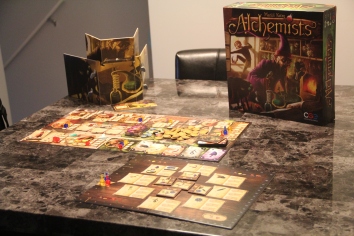 Alchemists is a worker placement logic puzzle created by Matus Kotry. Each player takes on a role of an alchemist who works for a mythical university. Players attempt to figure out the chemical composition of eight different ingredients used to make potions. Anything from ferns, flowers, mandrakes, or even toads. When two ingredients are combined they can create one of 7 different potions, used for things like speed, strength, poison, or paralysis. The goal of the game is to test, experiment, and publish papers on these ingredients while selling potions to various adventurers in order to get the most reputation points. The one who gets the most points wins the game.
Alchemists is a worker placement logic puzzle created by Matus Kotry. Each player takes on a role of an alchemist who works for a mythical university. Players attempt to figure out the chemical composition of eight different ingredients used to make potions. Anything from ferns, flowers, mandrakes, or even toads. When two ingredients are combined they can create one of 7 different potions, used for things like speed, strength, poison, or paralysis. The goal of the game is to test, experiment, and publish papers on these ingredients while selling potions to various adventurers in order to get the most reputation points. The one who gets the most points wins the game.
Out of all the board games I have played thus far, this board game has one of the most elaborate setups I’ve seen. Each player is given an upright laboratory station, which has a triangular gameboard that is used to keep track of the results of their experiments. Players are also given deduction cards to keep track of their notes. The laboratory itself has a shelf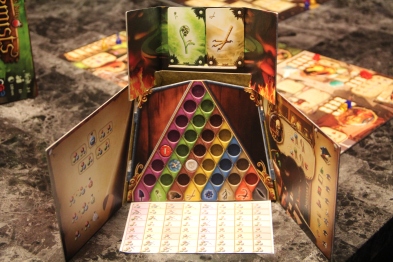 that acts as a cauldron and you put your ingredients “into the cauldron” by placing your cards on the shelf. The game also has a companion app, which randomly selects the chemical composition of each of the eight ingredients. The app is used to give the results of the experiments done in the laboratory. It uses a scanning feature with the smart phone’s camera and can identify what ingredients were put into the cauldron. Although I appreciate the creativity in this game’s setup, the shelf itself was a bit finicky when putting ingredients, and the app had some troubles identifying which cards were in my cauldron. In any instance, it was an innovative work station for players to hide their notes and mix their potions.
that acts as a cauldron and you put your ingredients “into the cauldron” by placing your cards on the shelf. The game also has a companion app, which randomly selects the chemical composition of each of the eight ingredients. The app is used to give the results of the experiments done in the laboratory. It uses a scanning feature with the smart phone’s camera and can identify what ingredients were put into the cauldron. Although I appreciate the creativity in this game’s setup, the shelf itself was a bit finicky when putting ingredients, and the app had some troubles identifying which cards were in my cauldron. In any instance, it was an innovative work station for players to hide their notes and mix their potions.
Alchemists runs on a logic puzzle mechanic, a mechanic that I’ve always loved in board games (it’s why I often enjoy the game Clue.) Each ingredient has a unique chemical structure. When one ingredient is mixed with another, it will form a potion based on the polarity and the size of a the “molecule”. For example, if the mandrake has a large red “+” molecule and the mushroom has a small red “+” molecule, then the potion created will be a red “+” potion. Now this is also juggled by two other colours, blue and green, each one 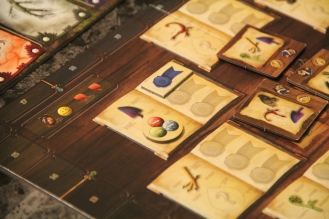 having a different polarity. When you randomly mix two ingredients together, the app will give you the outcome of that potion, and you can deduce on your game sheet what chemical structures it cannot be. If you mix a flower with a raven’s claw for instance and it makes a green “-” potion, you know that the chemical structure of these two ingredients cannot constrain a green “+” at all and so you make notes on your game sheet. Watching what other players do will also give you clues as to what the chemical structures are. You will see players publish papers that tell what the exact structure is, and if you compare with your own notes, you can either agree to that structure, or completely debunk their theories to gain more points. To me, this logic mechanic is like having multiple players racing to complete the same game of Sudoku. This is what makes the game very ingenious and a bit of a challenge for the brain.
having a different polarity. When you randomly mix two ingredients together, the app will give you the outcome of that potion, and you can deduce on your game sheet what chemical structures it cannot be. If you mix a flower with a raven’s claw for instance and it makes a green “-” potion, you know that the chemical structure of these two ingredients cannot constrain a green “+” at all and so you make notes on your game sheet. Watching what other players do will also give you clues as to what the chemical structures are. You will see players publish papers that tell what the exact structure is, and if you compare with your own notes, you can either agree to that structure, or completely debunk their theories to gain more points. To me, this logic mechanic is like having multiple players racing to complete the same game of Sudoku. This is what makes the game very ingenious and a bit of a challenge for the brain.
Alchemists also encourages players to specialize in gaining reputation points. Players can either focus on research by creating theories and earning grants, or focus on the business elements, and sell potions to different adventurers. There are enough choices on the board for players to make well reasoned decisions without intimidating them.
One of the big issues I found with this game is the recommended time suggested by the box. Even after reading the rules and watching YouTube videos about this game, it takes about three to four hours to play a whole game. This is usually due to the fact that players need a bit of time to look at their notes and make deductions based on what had been done through the course of the game. Often I had to say to my friends, “can we pause for a moment, I just need to catch up with my notes.” And even when you had a good grasp of the logic, you had to often use the clues on the board to make assumptions on your own notes. It’s got that mathematical feel to it; I would often say, “assume toad is all three minuses, (based on a theory already published), then the other ingredients must be these characteristics. For me, I felt like I was doing a puzzle I would see in the local paper. For others, it felt like doing math homework, tedious and excruciating. 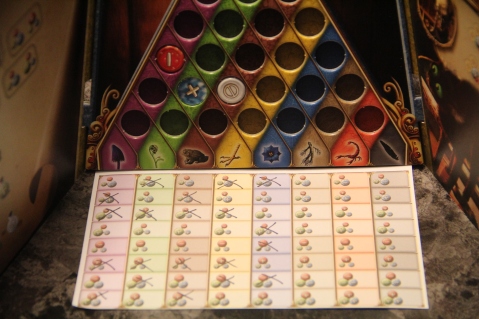
Another issue I had with this game was the components. Don’t get me wrong, there are some pretty cool and innovative components in this game, especially being able to integrate portable technology and to have the three-dimensional lab workstation for you to hide all your ingredients and theories. However, there is no real easy way to correct your mistakes on the potion board. I often found myself scratching at my potion board because I had put the wrong token in the wrong place. This game also requires a large table. My house has a small surface to play on, and given the number and the size of the components, I felt constrained. There was one point where I accidentally punched my potion board and I lost a third of my notes (I also cried a little at that point). The shelf that acted as a cauldron for the cards had a small slit in it, and as a result cards that I placed on it would fall through. The cauldron was more of hindrance in the game, and most players opted to take it off their work station and just hide their cards behind their screens.
Now what happens when none of the players have the Alchemists app? The game has provided an alternative solution by providing an answer key for a games master to create. The games master will place tokens in the key, and then whenever a player tests a potion, or sells a potion to a merchant, the games master will provide the outcome. I personally don’t like that at all. You need to get the app for this game. Most people in this generation have a smart phone and can simply download the app. Using their answer key forces one player to not even play the game. The only time where I would even recommend using the answer key is if you are trying to teach a new group of people this game and you walk through with all the players in how to play it.
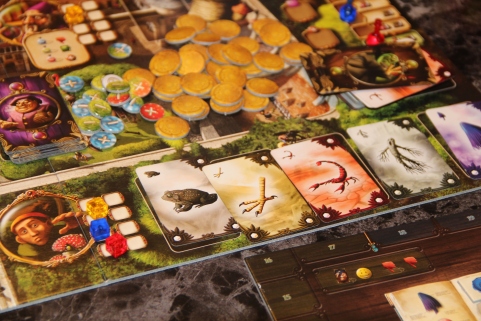 Alchemists has a very steep learning curve. If you have the time and patience, the game will pay dividends. I love the whole science-esque theme of the game when your testing, making deductions, and ultimately getting that “ah-ha” moment. The game innovatively combines the logic and reasoning of Clue with the strategy of a worker placement game. It’s also one of the games that is spearheading the integration of portable technology with tabletop gaming. There are A LOT of components to this game meaning the setup will be lengthy and you will need to find a way to keep the game organized. Overall, I’m glad that I have the option to rent games, because personally I don’t think I would buy it.
Alchemists has a very steep learning curve. If you have the time and patience, the game will pay dividends. I love the whole science-esque theme of the game when your testing, making deductions, and ultimately getting that “ah-ha” moment. The game innovatively combines the logic and reasoning of Clue with the strategy of a worker placement game. It’s also one of the games that is spearheading the integration of portable technology with tabletop gaming. There are A LOT of components to this game meaning the setup will be lengthy and you will need to find a way to keep the game organized. Overall, I’m glad that I have the option to rent games, because personally I don’t think I would buy it.
Pros:
- Innovative logic and deduction game.
- Most creative set up for a board game I’ve seen so far.
- Integrates technology and tabletop gaming well.
Cons:
- Very steep learning curve; not only are you teaching the game, you have to teach a logic puzzle.
- Game is longer than what it states on the box (2 hrs)
- The intricate components don’t allow for much wiggle room.
- The set up is demanding.
- The non-app option prevents a player from actually playing the game.


Have you tried Apotheca? Another fun potion-themed game.
LikeLike
I haven’t even heard of that game until you mentioned it. Thanks for the suggestion. I briefly took a look at it and it looks like an interesting puzzle game.
LikeLiked by 1 person